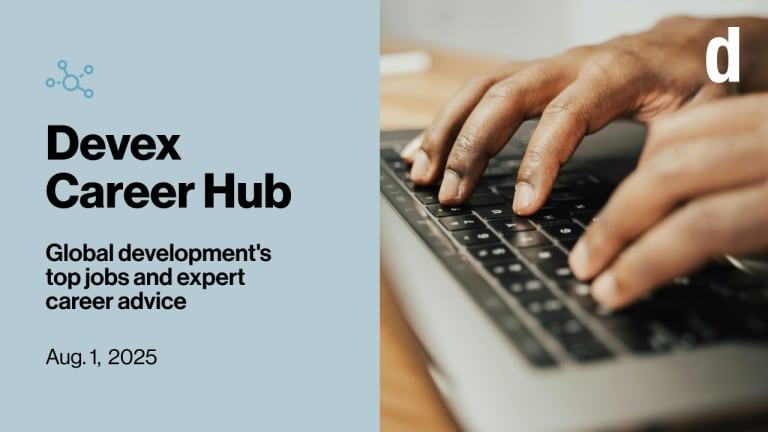3 tips for adapting to an AI-integrated development workplace
During a recent digital careers event, experts offered guidance on how professionals can stay ahead of the curve as AI becomes increasingly relevant to development roles.
There is not much certainty for professionals in today’s development sector, but when it comes to artificial intelligence, it’s no longer a question of if it will impact their work, but when. “The horses have left the barn,” Bart Édes, a development professor of practice at McGill University, said of AI’s integration with development work during a recent Devex digital event. “It's a part of our lives now, and will continue to adapt and become a more important part of the development sector.” Édes was joined by international development HR adviser Jack Jarrett in offering guidance on how professionals can stay ahead of the curve as AI becomes increasingly relevant to their roles. “Start experimenting with AI tools in your current work now, but do it thoughtfully,” Jarrett advised. For development professionals looking to gain foundational knowledge on how to best integrate AI into their work, here are a few key takeaways from our discussion. Let your immediate needs guide you Early AI adopters in tech-heavy development spaces have already exhibited advanced use cases of the technology, including in global health and agriculture. But AI’s ability to optimize everyday workflows is why all sector professionals should gain foundational knowledge of how it works and how it can be applied to their work, Édes said. For those new to the sector or between jobs, it’s essential to “make sure that recruiters and potential employers know what you're capable of doing,” he added. If you’re starting from scratch, focus on getting to know what widely used AI tools are capable of and how some of this might be specifically applied to your role. “[Look] at platforms that address immediate needs, so practical needs, rather than diving into highly technical tools,” Jarrett said. Many of the tools used in development are not specific to the sector, such as generative AI platforms ChatGPT and Claude, Jarrett said. These are commonly used for proposal writing, report drafting, and content creation. Perplexity is also helpful for quick research and provides specific citations to original information sources, Édes added. Take initiative to learn on your own “You don't need to go get a degree in computer science or in some aspect of artificial intelligence, but you do need to know how to use basic tools,” Édes said. The good news is that there are many free or inexpensive courses and tutorials available to help development professionals learn on their own. Among the recommendations by Édes and Jarrett are DeepLearning.AI’s “AI for Everyone” and Google’s introduction to generative AI. Jarrett emphasized the importance of developing strong prompting skills, which involves giving instructions to an AI system to guide its output. “These tools are only as good as the prompts you put in,” he added. The point was also made that while development recruiters are increasingly valuing AI skills in some candidates, AI integration has been largely fueled by employees rather than employers, so professionals shouldn’t necessarily expect training to be offered by their organizations. “It's taking some organizations a bit longer than others [and] it’s very much being individually driven,” Jarrett said of AI integration, adding that there’s no reason to wait for an organizational mandate to start experimenting. Understand ethical concerns and other AI risks “I personally believe AI is a net positive for the development sector, but I think there are important caveats that require active attention and management,” Jarrett said. Data privacy, bias, and transparency are among the key problem areas to be aware of, but there are also environmental and digital access concerns that development professionals in particular should consider. “The environmental impact of AI, particularly as energy consumption and data demands, is a serious concern, and I think that does conflict with the Sustainable Development Goals,” Jarrett said. To gain a solid understanding of AI risk factors, several free courses offering broad overviews are available, including the Ethics of AI, created by the University of Helsinki. There are also ones geared toward those in the development and nonprofit space, including Apolitical’s course on data privacy for public servants. “We need to be vigilant and continue to raise these issues and recognize, as we're using AI, that it's a tool, it's a complement, [and] it can help us. But there are limitations,” Édes said. Ready to stand out from the crowd and get noticed by the recruiters who matter most? Update your Devex profile and start connecting with top global development recruiters now.
There is not much certainty for professionals in today’s development sector, but when it comes to artificial intelligence, it’s no longer a question of if it will impact their work, but when.
“The horses have left the barn,” Bart Édes, a development professor of practice at McGill University, said of AI’s integration with development work during a recent Devex digital event. “It's a part of our lives now, and will continue to adapt and become a more important part of the development sector.”
Édes was joined by international development HR adviser Jack Jarrett in offering guidance on how professionals can stay ahead of the curve as AI becomes increasingly relevant to their roles. “Start experimenting with AI tools in your current work now, but do it thoughtfully,” Jarrett advised.
This article is exclusively for Career Account members.
Unlock this article now with a 15-day free trial of a Devex Career Account. With a Career Account subscription you will get:
- Full access to our jobs board, including over 1,000 exclusive jobs
- Your Devex profile highlighted in recruiter search results
- Connections to recruiters and industry experts through online and live Devex events
Start my 15-day free trialAlready a user?
Printing articles to share with others is a breach of our terms and conditions and copyright policy. Please use the sharing options on the left side of the article. Devex Pro members may share up to 10 articles per month using the Pro share tool ( ).
Justin is a contributing writer and editor who previously led Devex’s careers content strategy. Before joining Devex, Justin served as the managing editor of Springwise, covering sustainable and climate-tech innovation across all business sectors. He also spent over 13 years as an editor and writer for the New York Times, specializing in digital content production and strategy while producing written and multimedia content on a range of topics, including travel, sports, and technology.








